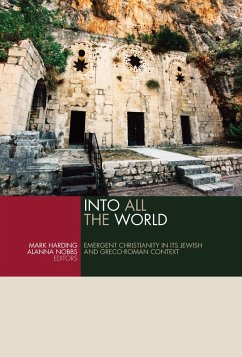Into All the World-the third volume from editors Mark Harding and Alanna Nobbs on the content and social setting of the New Testament-brings together a team of eminent Australian scholars in ancient history, New Testament, and the early church to take the story of Christianity into the Jewish and Greco- Roman world of the first century. In thirteen chapters, the contributors discuss all the post-Pauline New Testament writings, devoting attention to both their content and their context. They examine the impact of the growth of the church on both Jews and Gentiles, exploring issues such as the diaspora, minorities, the Book of Acts, and the Fourth Gospel. The book then proceeds to a discussion of the impact of Christianity on the Roman state, including consideration of the book of Revelation and the imperial cult. A final chapter investigates how the church was perceived by Clement of Rome at the end of the first century.
Bitte wählen Sie Ihr Anliegen aus.
Rechnungen
Retourenschein anfordern
Bestellstatus
Storno


